- Home
- Alex Scarrow
Day of the Predator Page 5
Day of the Predator Read online
Page 5
‘Al done!’
‘Good. Now we’ve got to do the same thing for the others. Only we’l be set ing those to stasis.’
others. Only we’l be set ing those to stasis.’
Sal looked down at the open case on the oor, and the other vials containing growth candidates. Then she looked at Liam, stil out for the count, his face resting against the cold concrete oor amid a smal pool of spit le and vomit.
‘Great. Thanks for the help, Liam.’
‘Bl f i f wheeeel y gloob!’ said Liam, his mouth ful to bulging.
Both girls looked at him. ‘What?’
Liam chewed vigorously for a moment, then nal y swal owed. ‘I said this is real y good! What is it?’
‘Lamb korma,’ replied Sal. ‘It’s nothing like how Mum used to make it back home. You have it much sweeter over here. I suppose Americans like their food real y sweet?’
Maddy nodded. ‘Sweeter the bet er. I could live just on chocolate.’ She reached across their table and pul ed a carton of mango chutney out of the brown paper takeaway bag.Liam hungrily loaded another forkful of korma into his mouth.
Across the archway, music streamed from the computer. Maddy had an Internet radio station playing music she remembered her parents listening to: the Corrs, REM, Counting Crows.
‘It’s kind of weird just us three, though,’ said Sal. ‘I miss Foster.’
‘Me too,’ said Maddy.
‘We’re never going to see him again, are we?’
‘We’re never going to see him again, are we?’
She shrugged. ‘Probably not. He had to go.’
‘Why?’ asked Liam.
She hesitated a moment. ‘He was sick.’
‘Yeah,’ said Sal thoughtful y. ‘He didn’t look wel .’
‘What was wrong with him?’
Maddy played with the rice on her plate for a moment.
‘Cancer. He was dying of cancer. He told me that.’
‘Poor, poor fel a,’ sighed Liam. ‘I real y liked him. Reminded me a bit of my grandfather, so he did.’
They ate in silence for a moment.
‘It’s strange, though,’ said Sal. ‘We’re part of this … this agency, but it doesn’t feel like we’re part of anything, if you know what I mean.’
‘I know what you mean,’ said Liam. ‘Like it’s just the three of us in this lit le archway al on our own. No contact with anyone else.’ He looked up at Maddy. ‘Did he not say there were other groups like us? Other eld o ces?’
She nodded. ‘He did.’
‘But we never ever hear from them. There’s no information about them, or about this agency. No one has contacted us, right?’
‘No one.’
Sal put down the poppadom she’d been holding. ‘What if it real y is just us, just us alone … here?’
The other two looked at her.
‘What if we are the agency?’ she added.
Liam’s eyebrows arched and his jaw dropped open. Liam’s eyebrows arched and his jaw dropped open.
‘God help us al if that’s the case.’
Maddy shook her head. ‘It’s not just us. Someone else stashed those foetuses back in 1906, right?’
‘Could that not have been Foster?’
‘Could be.’ Maddy shrugged. ‘But then you’ve got to ask who genetical y engineered the foetuses? That’s got a need other people, some facility somewhere.’ The other two had no answer for that. ‘Fact is,’ she continued, ‘there’s more to this agency than just us. There are others out there somewhere or somewhen.’
‘So how do we talk with them?’ asked Sal. ‘How can we meet them?’
‘I think that’s exactly the point. I think we’re not supposed to.’ Maddy slurped her Dr Pepper. ‘Maybe we’re a bit like some sort of terrorist organization; for al of our safety, no one group can know where another group is. We operate in isolation. It’s just us … until …’ Her words tailed o and they sat in silence for a while contemplating where that sentence ended.
‘Not much chance of a big Christmas get-together, then?’
mut ered Liam.
Maddy snorted drink on to the table, relieved that he’d found a way to break the sombre mood.
‘At least,’ said Sal, ‘we’l have a brand-new Bob to protect us soon.’
‘Aye. I miss the big ape.’
Maddy pointed to the bank of computer monitors. ‘He’s just there!’
just there!’
‘Naw,’ said Liam, wrinkling his nose, ‘it’s not quite the same him being in there.’
‘You can’t exactly hug a computer monitor,’ said Sal. Liam chuckled. ‘Quite right. I miss his tufty round coconut head.’
‘And that dumb, total blip-head expression on his face,’
added Sal.
‘Aye.’
Maddy nished a mouthful of curry. ‘Wel , we’l have him around soon. Foster’s “how to” manual says the growth cycle should take about one hundred hours.’ She pushed her glasses up her nose. ‘Lemmesee … that’s just over four days.’
‘We’l need some new clothes for him,’ said Sal. ‘I’l see what I can nd for him downtown tomorrow.’
Maddy nodded. ‘Good idea.’
They nished the Indian takeaway and bagged up the rubbish. Liam volunteered to take it out as the girls changed for bed. He crossed the archway oor, crisscrossed with snaking power cables, and lifted the front shut er enough to duck under and step out into their backstreet.
A ickering blue light dimly lit the street. Above him, bright halogen oodlights il uminated the thick metal spars of the Wil iamsburg Bridge arcing across the at docile water of the Hudson River. On the far side – a sight he was stil yet to get used to – was Manhat an, a vibrant inverted crystal chandelier of winking city lights and inverted crystal chandelier of winking city lights and nudging tra c.
He dropped the bag into the trash can, and sucked in the cool night air.
Tonight al was wel with the world. Tomorrow was the day planes crashed into buildings and the sky was a dark smudge al of the day.
He hated the Tuesdays.
‘Good night, New York,’ he ut ered under his breath. The city replied with the rumble of a train along the bridge overhead and the echoing, distant wail of a police siren racing through a Brooklyn street several blocks away. As he prepared to duck back inside and wind the shut er down once more, he found himself wondering if Sal was right. If they real y were alone. If the agency was, in fact, just them.
As it happened, the answer to that speci c question was to arrive the very next morning.
CHAPTER 10
2001, New York
Maddy was entirely engrossed in Big Brother USA when Bob interrupted. She’d been watching Nicole and Hardy quietly plot ing together in the kitchen against the other two. It was a rerun of the previous week’s shows on FOX
and she already knew who was facing imminent eviction. She’d seen this show at least four times already, but for some reason, despite knowing the outcome, it was stil compulsive viewing.
So it was with mild irritation that she answered the dialogue box that had popped up on the monitor over the top of Big Brother.
> Maddy?
She sat forward and spoke into the desk mic rather than tap out an answer on the keyboard.
‘What is it, Bob? I’m watching Big Brother right now.’
> I am picking up incoming tachyon particles. Her mouth dropped open and she dribbled milk and Rice Krispies on to her T-shirt.
‘You’re kidding me, right?’
> Kidding?
‘Joking.’
> Not joking, Maddy. There is a directed
> Not joking, Maddy. There is a directed
communication beam coming in from down-time.
‘From down-time … You mean the future?’
> A rmative.
Maddy dropped her spoon back in the breakfast bowl and sat back in her chair. She looked around. Liam was stil fast asleep on his bunk and Sal was out
clothes shopping for Bob.
Oh my God … a message from the future?
She realized then and there that it could only be from the agency – their rst contact with the rest of the organization – and just when they were real y beginning to wonder whether the three of them were al on their own.
‘What’s the message, Bob?’
> Just a moment … just a moment. Decoding …
Sal had decided not to bother going uptown, over the bridge into Manhat an. The clothes shops there were al modern chain stores and none of them were likely to have much that would t a seven-foot mountain of muscle. Instead she headed into Brooklyn, an area she hadn’t explored at al thus far. Foster had been so very keen on her focusing her at entive eyes on Manhat an and Times Square – taking in every tiny detail until she knew everything that was meant to be there, every tiny event that was meant to happen – that she’d had no time to explore the city this side of the Hudson River. Away from the bridge and South 6th Street, she found myriad quieter backstreets, and one in particular lined myriad quieter backstreets, and one in particular lined with odd lit le boutiques sel ing second-hand furniture and dusty old books. The chaos of goods piled outside the storefronts and clut ering the narrow street reminded her vaguely of the market-place near her home in Mumbai. She found herself wiping a solitary tear from her cheek and chided herself for crying for her parents … because –
stupid – they weren’t dead. The grim fate that awaited them wasn’t going to happen for another twenty-ve years. At this moment in time, her mum and dad were just kids her age, enjoying their childhood and not due to meet for another decade yet. Strange, that. Stood side by side, she and her mum could probably pass as sisters.
Her at ention was drawn to a shop with a curious mix of antique knick-knacks spil ing out of its entrance and on to the pavement. Ancient-looking wooden furniture, a rocking-horse and clothes that looked like surplus theatrical costumes. But among them, bric-a-brac, a secondhand TV set, a toaster, a Dyson vacuum cleaner. A lit le bit of everything, it seemed.
She gured she had as much chance of nding
something here that might t Bob as she might anywhere else and, anyway, everything here appeared to be pret y cheap. She stepped inside the boutique and squeezed through the front of the store, clut ered with a set of chrome bar stools and several aking display-window mannequins wearing dodgy-looking leather corsets and feather boas.
‘May I help you, young lady?’
‘May I help you, young lady?’
The voice seemed to come out of nowhere and she jumped. Then she spot ed a tiny old lady with jet-black hair who was even shorter than she was.
‘I, uh … You made me jump.’
She smiled. ‘I’m sorry, my dear. I do tend to blend into the store.’
Sal laughed. She could imagine a customer slapping ten dol ars down on the counter for the ‘realistic old lady mannequin’, tucking her under one arm and walking out with her.
‘What are you after, my dear?’
‘You have a clothes section?’
She waved an arm. ‘At the back. I have racks and racks of old, old clothes and party costumes. Lots of cast-outs from the Broadway theatres and a few antique items too.’
‘Thank you.’
Sal weaved her way further into the store, her nose tickled and teased by the dust that seemed to be on everything and the faint smel of mothbal s and turpentine. She found the clothes racks at the back and almost found herself giggling at the bizarre mix of garments on display. She icked through the racks in front of her, chuckling at some of the exotic costumes and cooing appreciatively at others. Eventual y she found some things that looked suitable for Bob: a baggy pair of striped trousers with extra-long legs that she suspected might have been part of a clown’s out t at one time and an extra-large bright orange and pink Hawai an shirt that looked like it might orange and pink Hawai an shirt that looked like it might just about t over the top of his broad shoulders and rippling muscles.
‘You must have a very big friend,’ said the old lady as she took Sal’s payment and folded the clothes into a plastic bag for her.
‘Uncle,’ she replied. ‘My Uncle Bob. He’s a very big man.’ Sal was about to add that he was also pret y dumb as wel – dumb, and kind of child-like – when she spot ed something dangling from a hanger on one wal : a white tunic, but oned down the left side, with an emblem on the chest that she recognized – the White Star lines. It was a steward’s tunic just like Liam’s.
She pointed at it. ‘Is that … is that a uniform from the Titanic?’
The old woman looked round at where she was
pointing. ‘Oh, that? No, it would be worth a lot more if it was genuine. I could sel it to a museum or a col ector for thousands of dol ars. Unfortunately it’s not; it’s just a theatre costume. Not a very wel -made costume either. Friends of mine … they did a production set on the Titanic. It didn’t do very wel . You want to have a look at it?’Sal shook her head. She could’ve said something about it being a funny coincidence that her bunk-buddy was a young lad who’d actual y worked on the ship for real. The old lady would think her mad, of course, or that she was just being cheeky. Mind you, in just over half an hour’s time, when the rst plane hit the Twin Towers, whatever time, when the rst plane hit the Twin Towers, whatever odd conversation she might have now would be instantly forgot en.
Sal returned to the archway with Bob’s clothes and some groceries before the rst plane hit and the Manhat an sky started to l with smoke. She was about to mention the coincidence to Liam – the steward’s tunic exactly like his – when she realized by the expressions on Maddy’s and Liam’s faces that something important had just happened. She forgot al about it.
CHAPTER 11
2001, New York
‘It’s a message from the agency,’ said Liam as Sal joined them beside the computer desk. ‘From the future.’
‘So.’ Sal looked at them both. ‘There’s our answer. We’re not alone, then.’
‘Yup!’ replied Maddy, grinning, clearly the most encouraged and excited by that news. ‘Bob’s decoding the message right now. He’s estimated the year of origin to be about 2056. That’s the time of Roald Waldstein, the inventor of time-travel technology.’
‘Do you think it’s him? The Waldstein fel a?’ asked Liam.
Maddy reached for her inhaler on the desk and took a quick pu on it. ‘Yes,’ she replied. ‘Hopeful y it’s the agency checking in with us. You know? Seeing if we’re OK. Which would be nice.’
‘But how …’ started Liam, frowning. ‘But how wil we talk back to them? These tachyon signal things can only go backwards in time, right? That’s what Foster said.’
‘He said that … but he was keeping it simple. It takes a lot more energy to project forward. Plus, more importantly, in 2056, everyone’s on the lookout for tachyon particles, right, Bob?’
tachyon particles, right, Bob?’
> Correct. A signal aimed at the agency could be detected and reveal its location. In 2056, international laws against time travel have been established.
‘In any case, I wouldn’t know which direction to point a signal,’ said Maddy. ‘Who knows where in the world they’re based?’
‘So is there a way to talk back?’ asked Liam. Maddy nodded. ‘Yup … there is.’ There was an entry in Foster’s ‘how to’ guide on how to contact the agency, a short explanation by Foster looking ten years younger as he spoke to the webcam. An entry he must have recorded much earlier than the others.
‘It’s the same principle, Liam, that you used actual y,’
said Maddy. ‘The museum guest book, remember? Only it’s a New York newspaper. We place an advert in the lonely hearts section of the Brooklyn Daily Eagle. It has to begin with the phrase “a soul lost in time …”’
Liam clicked his ngers; he understood the rest. ‘And I suppose they have a crinkly old yel owing copy of that paper?’
‘Dated September twelfth, 2001. That’s r
ight.’
Sal looked from one to the other, her eyes widening.
‘And … and do you mean the words in the paper change?
They actual y change on the page?’
Maddy nodded. ‘It’s a tiny ripple in time. Nothing that would change anything else. After al … who’s going to be reading the lonely hearts section of the papers tomorrow?’
‘The papers would be ful of that plane-crashing-into-‘The papers would be ful of that plane-crashing-intobuilding story, wil they not?’ said Liam.
‘Exactly. Our lit le advert won’t be noticed by anyone, except, of course … a bunch of people careful y studying a page of a fty-ve-year-old newspaper in 2056, or thereabouts.’ Maddy clucked with excitement. ‘I can’t tel you how freakin’ relieved I am that there’s somebody else out there!’
Liam nodded at the screen in front of her. ‘Looks like Bob’s done.’
> I have decoded the message, Maddy.
‘What is it?’
> It is only a partial message. The signal has been interrupted.
‘Uh? OK … give us what you’ve got, Bob.’
Words spooled across the dialogue box:
> Contamination event. Origin time appears to be 10.17 a.m. 18 August 2015. Major contamination ripples. Signi cant realignment of time stream. Death of Edward Chan, author of original theory on time travel, resulting in failure to write thesis in 2029. Death may have been deliberate assassination at empt. Occurred while visiting Instit–The three of them waited for a moment for Bob to print out more of the message.
> That is al I have. The partial ends there.
‘That’s it?’
> That is it, Maddy.
She turned to look at the others. ‘Er … what the hel are She turned to look at the others. ‘Er … what the hel are we supposed to make of that?’
They sat in silence for a while, digesting the smal block of text on the screen. Final y Liam shrugged. ‘That they’re in trouble?’

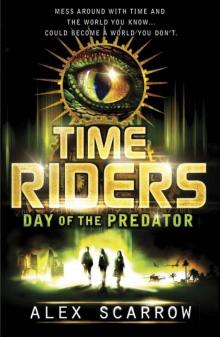 Day of the Predator
Day of the Predator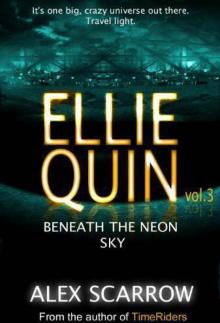 Ellie Quin Book 3: Beneath the Neon Sky
Ellie Quin Book 3: Beneath the Neon Sky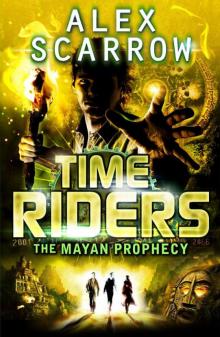 The Mayan Prophecy
The Mayan Prophecy October Skies
October Skies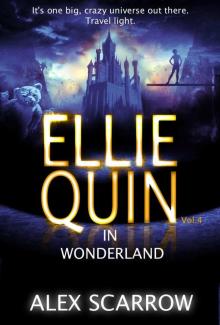 Ellie Quin Episode 4: Ellie Quin in WonderLand (The Ellie Quin Series)
Ellie Quin Episode 4: Ellie Quin in WonderLand (The Ellie Quin Series)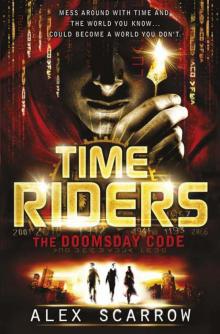 Time Riders
Time Riders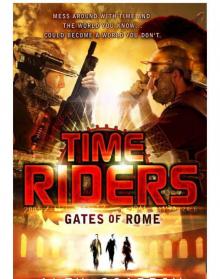 Gates of Rome
Gates of Rome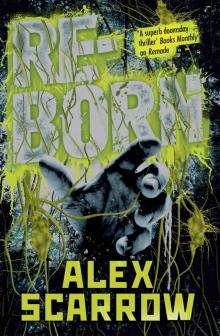 Reborn
Reborn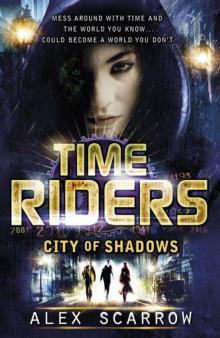 City of Shadows
City of Shadows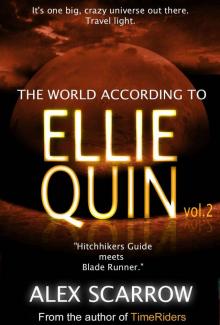 Ellie Quin Book 2: The World According to Ellie Quin (The Ellie Quin Series)
Ellie Quin Book 2: The World According to Ellie Quin (The Ellie Quin Series)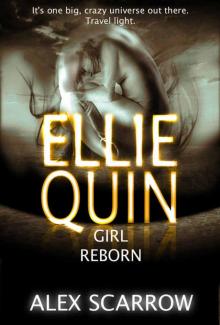 Ellie Quin Episode 5: A Girl Reborn
Ellie Quin Episode 5: A Girl Reborn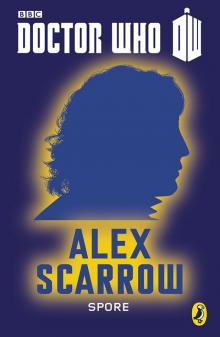 Spore
Spore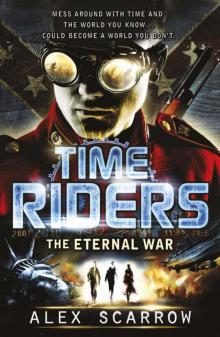 The Eternal War
The Eternal War Last Light
Last Light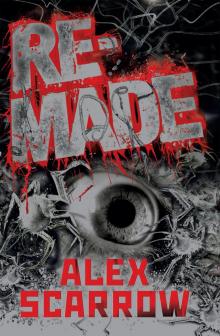 Remade
Remade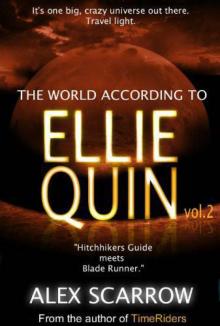 Ellie Quin Book 2: The World According to Ellie Quin
Ellie Quin Book 2: The World According to Ellie Quin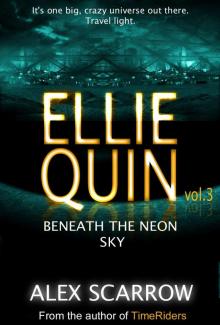 Ellie Quin Book 3: Beneath the Neon Sky (The Ellie Quin Series)
Ellie Quin Book 3: Beneath the Neon Sky (The Ellie Quin Series)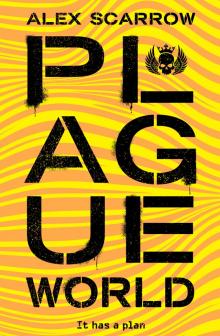 Plague World
Plague World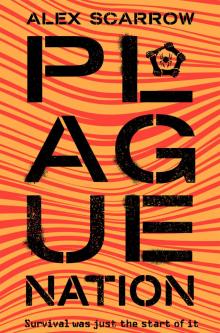 Plague Nation
Plague Nation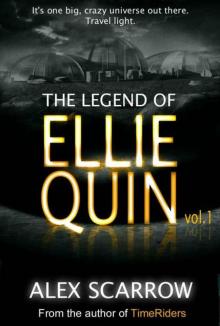 Ellie Quin Book 01: The Legend of Ellie Quin
Ellie Quin Book 01: The Legend of Ellie Quin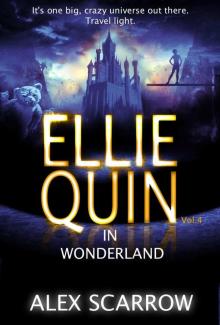 Ellie Quin - 04 - Ellie Quin in WonderLand
Ellie Quin - 04 - Ellie Quin in WonderLand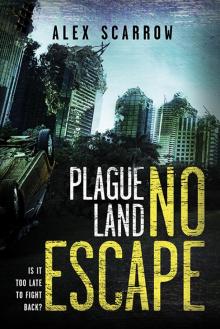 No Escape
No Escape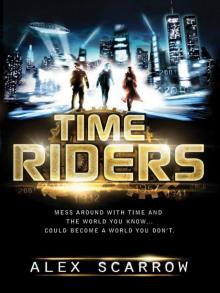 TimeRiders
TimeRiders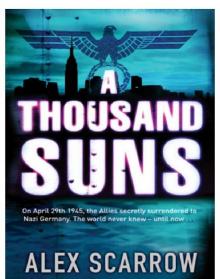 A Thousand Suns
A Thousand Suns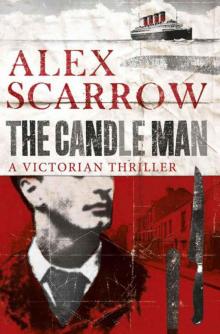 The Candle Man
The Candle Man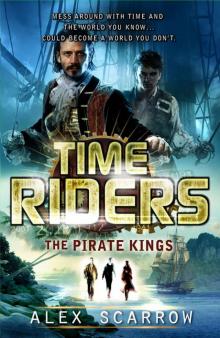 The Pirate Kings
The Pirate Kings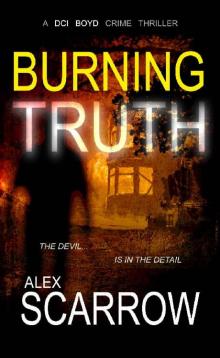 Burning Truth: An Edge-0f-The-Seat British Crime Thriller (DCI BOYD CRIME THRILLERS Book3) (DCI BOYD CRIME SERIES)
Burning Truth: An Edge-0f-The-Seat British Crime Thriller (DCI BOYD CRIME THRILLERS Book3) (DCI BOYD CRIME SERIES)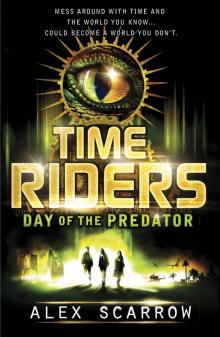 Day of the Predator tr-2
Day of the Predator tr-2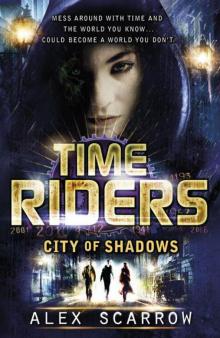 City of Shadows tr-6
City of Shadows tr-6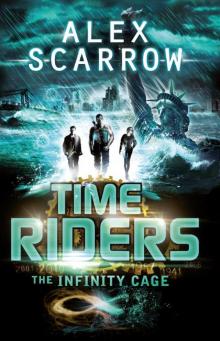 TimeRiders: The Infinity Cage (book 9)
TimeRiders: The Infinity Cage (book 9)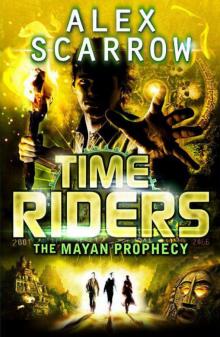 The mayan prophecy (Timeriders # 8)
The mayan prophecy (Timeriders # 8)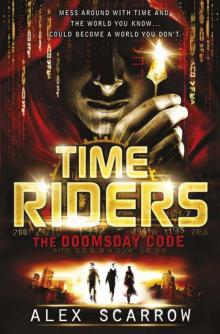 TimeRiders: The Doomsday Code (Book 3)
TimeRiders: The Doomsday Code (Book 3)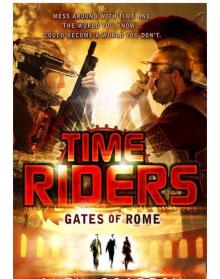 Gates of Rome tr-5
Gates of Rome tr-5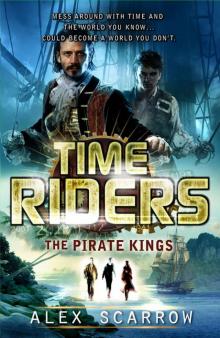 TimeRiders: The Pirate Kings (Book 7)
TimeRiders: The Pirate Kings (Book 7)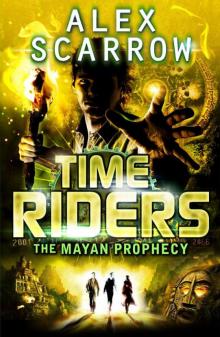 TimeRiders: The Mayan Prophecy (Book 8)
TimeRiders: The Mayan Prophecy (Book 8)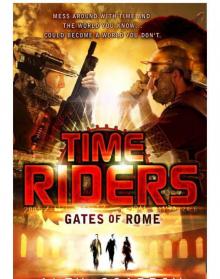 TimeRiders 05 - Gates of Rome
TimeRiders 05 - Gates of Rome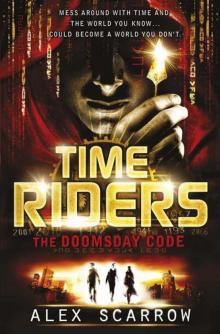 The Doomsday Code tr-3
The Doomsday Code tr-3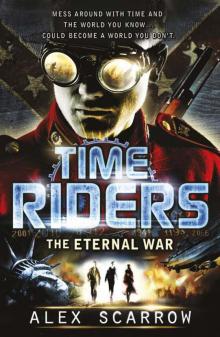 The Eternal War tr-4
The Eternal War tr-4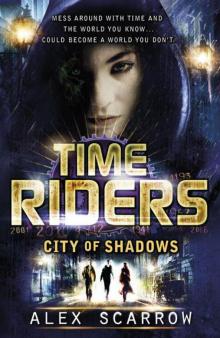 TimeRiders: City of Shadows (Book 6)
TimeRiders: City of Shadows (Book 6)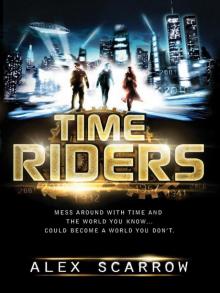 Time Riders tr-1
Time Riders tr-1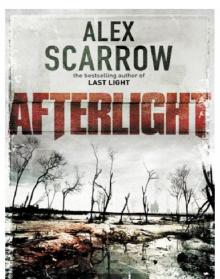 Afterlight
Afterlight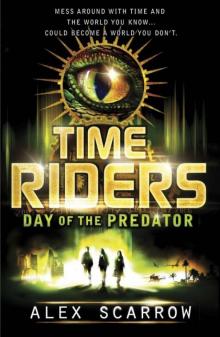 TimeRiders, Day of the Predator
TimeRiders, Day of the Predator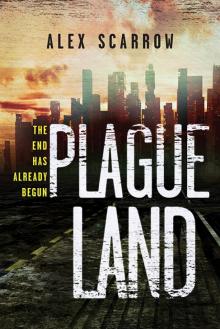 Plague Land Series, Book 1
Plague Land Series, Book 1